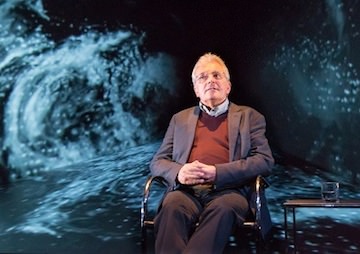Scientist Acts Out Dramatic Effect of Climate Change
A spellbinding solo performance by veteran climate scientist Chris Rapley puts the climate debate center stage -- and earns the admiration of London theater critics. Lone star: Professor Chris Rapley on stage at the Royal Court Theatre in London. Photo by Stephen Cummiskey
Lone star: Professor Chris Rapley on stage at the Royal Court Theatre in London. Photo by Stephen Cummiskey
By Tim Radford, Climate News NetworkThis Creative Commons licensed piece first appeared at Climate News Network.
LONDON — Climate science has just made cultural history — yet again. Following on from the sci-fi blockbuster The Day After Tomorrow and the Al Gore documentary movie An Inconvenient Truth, research has got personal and turned into a five-star dramatic soliloquy on the London stage.
Chris Rapley is a professor of climate science at University College London, a former director of the British Antarctic Survey, a former director of the Science Museum in London — and now, unexpectedly, an actor on the stage of the historic Royal Court theatre.
He is the star and only member of the dramatis personae of 2071, a play named after the date at which, he says, his eldest grandchild will be the age he is now. He has collaborated with playwright Duncan Macmillan, and with Katie Mitchell, a director with a track record of interest in the hard themes of humanity’s future on Earth.
No physical action
The performance, however, could almost be called anti-theatre. There is no conflict, no violence, and there is — beyond the discreet waving of a hand or the re-positioning of a leg — almost no physical action at all. The actor Rapley sits in one place, with only a glass of water as a prop, and embarks on a monologue.
Furthermore, it is in one sense an anti-dramatic monologue, sounding in many ways remarkably like a procession of extracts from the abstracts of scientific papers, or the executive summary of any number of publications of the Intergovernmental Panel on Climate Change.
There are few concessions to popular language: the diction and choice of terminology is of the kind you tend to hear at science briefings.
The difference is that it is gently and intelligently glossed — so cryosphere and lithosphere are identified as the worlds of ice and rock within a second of utterance.
The story unfolds calmly enough, with a kind of curriculum vitae of the actor, then a history of climate, then a history of climate research, and then the conclusions. It is the slow build-up to an alarming set of possibilities in a swift-changing world, with a time interval for action that is diminishing rapidly.
It ought not to work. But for this Climate News Network reporter, it does work — yet another spellbinding testament to that wonderful mix of space, lighting, darkness, silence, muted music, measured words and eager audience that we call theatre.
Emotive topic
Some critics and theatergoers will, inevitably, have reservations. Time Out magazine found its lack of theatricality “not a bad thing: sobriety feels important when tackling such an emotive topic”. The London Evening Standard took a cooler approach: “He lets the data speak for itself. But the approach feels too dry.”
But first responses were warm. There was a generous welcome from the Daily Telegraph, and Michael Billington — a distinguished dramatic critic who has declared his enthusiasm for theatre as a political instrument — gave it the highest rating of all in The Guardian: five stars.
His only complaint is that there is no printed text, as there is a lot of information delivered in a performance that lasts hardly more than 70 minutes.
But Billington writes: “If we look to theatre to increase our awareness of the human condition, the production succeeds on all counts.” And he ends unequivocally: “It is better than good. It is necessary.”
Your support matters…Independent journalism is under threat and overshadowed by heavily funded mainstream media.
You can help level the playing field. Become a member.
Your tax-deductible contribution keeps us digging beneath the headlines to give you thought-provoking, investigative reporting and analysis that unearths what's really happening- without compromise.
Give today to support our courageous, independent journalists.






You need to be a supporter to comment.
There are currently no responses to this article.
Be the first to respond.